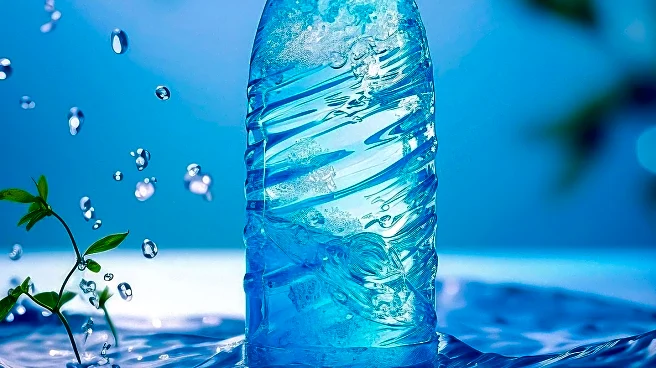What's Happening?
Recent research highlights the potential health risks associated with the consumption of bottled water due to microplastic and nanoplastic contamination. Sarah Sajedi, a researcher at Concordia University, has published a paper in the Journal of Hazardous Materials detailing the ingestion of microplastics from single-use plastic water bottles. The study estimates that individuals who consume bottled water ingest approximately 90,000 microplastic particles annually, significantly more than those who drink tap water. These particles, which are released during the manufacturing, storage, and degradation of plastic bottles, can enter the human body, potentially leading to chronic health issues such as inflammation, hormone disruption, and neurological damage.
Why It's Important?
The findings underscore a significant public health concern, as the widespread use of bottled water could contribute to long-term health problems. The ingestion of microplastics is not only a personal health issue but also a broader environmental challenge, as plastic waste continues to accumulate globally. The study calls attention to the need for increased awareness and education about the chronic toxicity of microplastics, as well as the importance of reducing reliance on single-use plastics. This research could influence public policy and consumer behavior, encouraging a shift towards more sustainable practices and alternatives to bottled water.
What's Next?
The study suggests that legislative action targeting single-use plastics should expand to include water bottles, which are currently less regulated compared to other plastic products like bags and straws. Increased public education on the risks of bottled water consumption is crucial. Future research is needed to better understand the long-term health impacts of microplastic ingestion and to develop standardized methods for detecting and measuring these particles. Policymakers, environmental groups, and health organizations may use these findings to advocate for stricter regulations and promote the use of safer, more sustainable water consumption practices.
Beyond the Headlines
The research highlights an ethical dimension regarding consumer rights to safe drinking water and the responsibility of manufacturers to ensure product safety. The potential health risks associated with bottled water consumption raise questions about corporate accountability and the need for transparency in the production and labeling of consumer goods. Additionally, the study may prompt a cultural shift towards valuing environmental sustainability and public health over convenience, influencing future consumer choices and industry standards.










